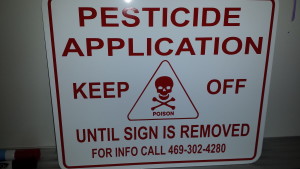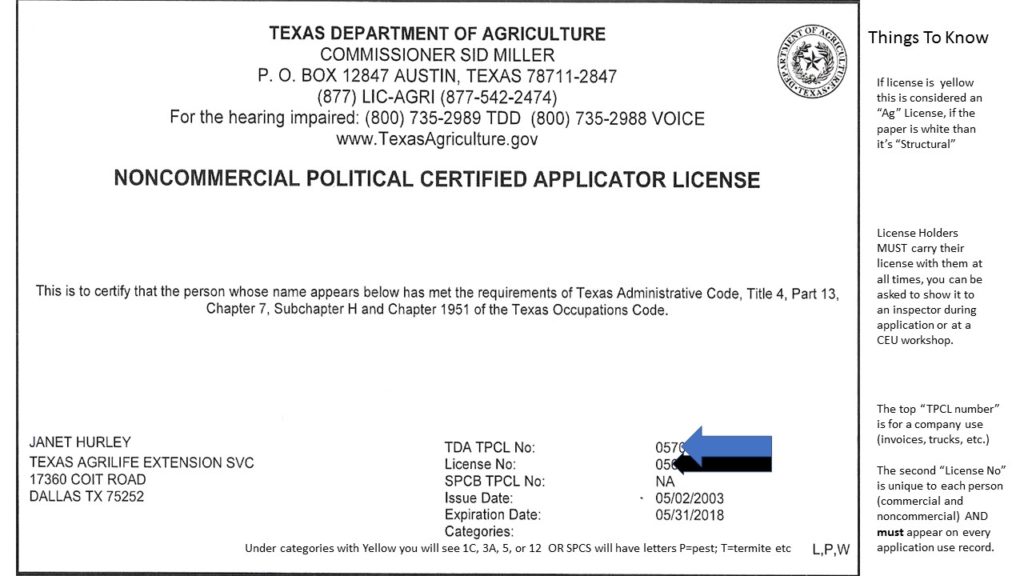Winter is almost over, and spring is heading our way, and it’s a good time to remind everyone of what the licensing and training requirements are for all employees. Texas has two sets of laws pertaining to pesticide applicators there is the Occupations Code and Agriculture Code. The Occupations Code covers the structural pest control applicators; Agriculture Code covers private applicators (Ag) and others like landscape management, greenhouses, right of way, vector, forest, and a few others.
Licensing
If you are an employee of a governmental entity, apartment building, day care center, hospital, nursing home, hotel, motel, lodge, warehouse, food-processing establishment, school (K-12) or educational institution (University/College), and other noncommercial entity then you are required to obtain a noncommercial pesticide applicator license under structural pest control if want to do conduct any pest control indoors. On the outdoor grounds public schools require licensed applicators for all pesticide applications. If you choose not to conduct pest control yourself, you can hire a licensed pest control contractor who can make these applications.
There are a couple of terms that need to be explained before I continue with this article. General Use Pesticides refer to insecticides, herbicides, rodenticides, etc. that is sold in a container that is less than or equal to one quart for liquid products or less than or equal to two pounds for dry or solid product. Or is ready for use, requires no further mixing or dilution before use, and is packaged in a container of one gallon or less for liquid products or four pounds or less for dry or solid products. Typically, these products are considered for consumer use and can be purchased at any local hardware store. However, if you plan to apply some of these products around children, animals, or high public use areas, you still need to have a license in many cases.
In Texas, under the Texas Administrative Code requires anyone who is going to purchase, apply, or supervise the use of restricted use pesticides, state limited use pesticides or regulated herbicides must have either a private applicator license or most commonly most fall under one of these categories landscape maintenance(3A) nursery plant production(3B), vegetation management(5), and/or public health pest control (12) {see the end of the article for what each of these license categories covers}. At the same time, no matter the chemical applied outdoors; applicators should remember to apply by using the appropriate ground application equipment and when winds do not exceed 10 miles per hour.
The reason for the above explanation comes from questions I receive about the ability to purchase weed killer or fire ant baits at a local store and the need to have a pesticide license. If you are a governmental entity, apartment building, day care center, hospital, nursing home, hotel, motel, lodge, warehouse, food-processing establishment, school (K-12) or educational institution (University/College), or some other group that has public exposure not only are you required to have a pesticide license to apply, it’s a good idea because you want our clients to know you are doing everything you can do to protect them.
Continuing Education Credits
One of the updates coming from EPA is additional certification and training for pesticide applicators, except in Texas we have required certification and training since 1997. The Texas Department of Agriculture has updated their rules to reflect the changing times, but overall, we have always been ahead of the curve with our requirements. If you are licensed under SPCS (like I am) then you must receive at least two general CEU credits each calendar year, then 1 credit in every category you are licensed in. For me I have Pest (P), Lawn & Ornamental (L) and Weed (W), so I must obtain 5 credit each year (January – December) so I can renew my license the next year.
For those of you who are licensed by TDA Ag then each commercial or noncommercial applicator must obtain at least five CEUs prior to the expiration of the license. A minimum of one hour each must be obtained from two of the following categories: integrated pest management, laws and regulations or drift minimization, then the rest can be considered general knowledge credits. Under the TDA CEU requirement those credits must be obtained from the time your license renews to expiration. So, if your license renews on March 1, 2018 and expires Feb. 28, 2019 then you will need to obtain 5 CEUs for your license renewal between those dates.
School IPM Coordinators, since 2009, TDA has required that you receive 6 hours of TDA approved IPM continuing education units (CEU) every three years. Superintendents are required to appoint a school IPM Coordinator or Responsible IPM Coordinator for districts that have more than one person trained in IPM and inform the Department of Agriculture within 90 Days of that appointment. Once appointed the School IPM Coordinator has six months to successfully complete a Department-approved IPM Coordinator training class. Texas A&M AgriLife Extension offers regionally to obtain some background on what is an IPM program and how it relates to school district operations.
It is also the requirement school IPM Coordinator and the license commercial or noncommercial applicators to maintain copies of YOUR CEU certificates for two years, but in some cases, you may need to hang on to these for five years; especially if you are tied to a school IPM program that only gets inspected every five years, for example.
Posting

Remember TX school IPM rules require that you post at the time of treatment and keep in place until the specified reentry has been reached.
This is a good time to remind everyone about posting and notification requirements. For schools, this might be a good time to remind teachers and parent groups about not using their own chemicals at the school garden. For public schools, remember that outdoor applications for Yellow and Red Category products require a sign, locked fence area, barrier tape or person to monitor for 4 hours after Yellow Category products and 8 hours after Red Category products.
For all indoor insecticide applications Texas requires that the licensee must provide a pest control sign to:
- a residential rental property owner or manager at least 48 hours prior to a planned indoor treatment at a residential rental property with five (5) or more rental units.
- the employer or building manager at least 48 hours prior to a planned indoor treatment at a workplace.
- the chief administrator, IPM Coordinator, or building manager at least 48 hours prior to a planned indoor treatment at a hospital, nursing home, hotel, motel, lodge, warehouse, food-processing establishment, school or educational institution, or day care center.
Notification
The Texas School IPM rules have required each public-school district prior to or by the first week of school attendance, ensure that a procedure is in place to provide prior notification of pesticide applications in accordance with the School IPM rules to parents and students. However, one of the things I’m asked about is how do schools who are close to an agricultural producer ensure their students and staff are not exposed to pesticides from neighboring properties.
Under the TAC Rule §7.37 TDA does have some additional Prior Notification Requirements for individuals that can request prior notification of a pesticide application:
- any person who works or resides in a building, house, or other structure located on land adjoining and within 1/4 mile of a field on which pesticides may be applied
- persons in charge of licensed day-care centers, primary and secondary schools, hospitals, inpatient clinics, or nursing homes within 1/4 mile of the field on which pesticides are to be applied.
- The parent of a primary or secondary school student may for good cause request notification from the department if the person in charge of the school has refused to request notification. (This is above the school IPM requirements)
- If the department determines that notification should be given, the department shall notify the farm operator to give notification to the person in charge of the school
- any person with chemical hypersensitivities, allergies, or other medical conditions which may be aggravated by pesticide exposure and whose residence or place of employment is within 1/4 mile of the field on which pesticides are to be applied.
Worker Protection Standards (WPS)
Worker Protection Standards applies to those who work in the Agricultural or Greenhouse Industries; however, these standards are good for anyone who is licensed and works with pesticides. The Texas Department of Agriculture and U.S. Environmental Protection Agency provided this information. The requirements in the current WPS are intended to inform workers and handlers about pesticide safety, provide protections from potential exposure to pesticides, and mitigate exposures that do occur. http://www.epa.gov/pesticides/health/worker.htm
- Pesticide safety training— for workers and handlers (remember this is important if you have people who work under your 3A, 3B, 5 categories)
- Access to labeling information— for pesticide handlers and early-entry workers
- Access to specific information— for workers and handlers, which includes providing information about pesticide applications on the establishment, emergency information, and a pesticide safety poster at a central location,
- Keep workers out of areas being treatedwith pesticides,
- Keep workers out of areas that are under a restricted-entry interval (REI), with a few narrow exceptions,
- Protect early-entry workerswho are doing permitted tasks in pesticide-treated areas during an REI, including special instructions and duties related to correct use of personal protective equipment,
- Notify workers about pesticide-treated areasso they can avoid inadvertent exposures,
- Monitor handlersusing highly toxic pesticides,
- Provide required personal protective equipmentto handlers,
- Decontamination supplies— a sufficient supply of water, soap, and towels for routine washing and emergency decontamination, and
- Emergency assistance— making transportation available to a medical care facility in case of a pesticide injury or poisoning and providing information about the pesticide(s) to which the person may have been exposed.
What Is:
Landscape maintenance(3A): to control pests in the establishment or maintenance of lawns or ornamental plants grown for function or aesthetic purposes in landscapes, such as athletic fields, residential properties, industrial sites, golf courses, parks, and cemeteries.
Nursery plant production(3B): to control pests in the production of ornamental plants or other nursery stock and commercial turf. This category includes plants in field production, greenhouses, shade houses, or similar structures.
Vegetation management (5): to control unwanted plant growth in rights-of-way, in the maintenance of roads, parking lots, utility lines, wind generator sites, pipelines, railways, airports, public surface drainways and ditches, industrial sites including oil field sites, adjacent riparian or natural areas and includes public sewer root control
Public health pest control (vector control)(12): for pesticide applications made for the purpose of treating, repelling, mitigating, or otherwise controlling any non-human organism that is, or may be, a vector of human disease by a pesticide applicator who is an employee of, or an independent contractor for, a federal, state, county, city, mosquito or vector control district or other political subdivision, or a person working under the direct supervision of a pesticide applicator who is an employee of, or an independent contractor for, a federal, state, county, city, mosquito or vector control district or other political subdivision.
Written by: Janet A. Hurley, Extension Program Specialist III


 .
.